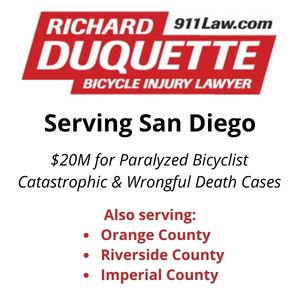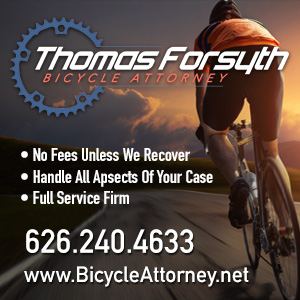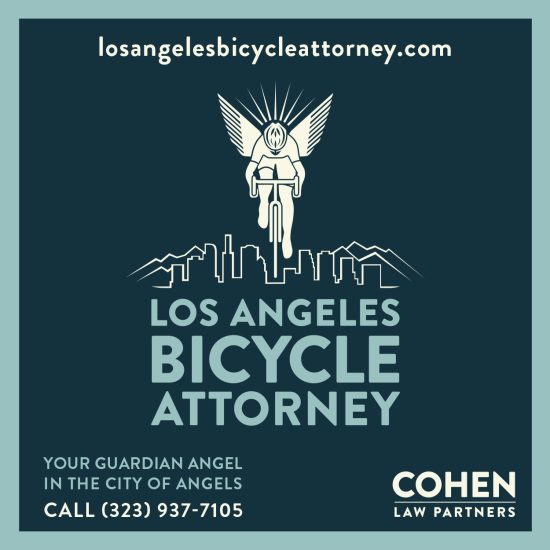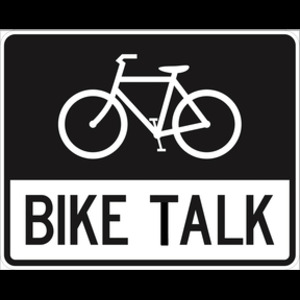Maybe he really did hit his head.
Something has to explain the seemingly overnight change in the Mayor’s support of bicycling.
His first four years in office, L.A. Mayor Antonio Villaraigosa never let the word bicycle pass his lips in public. Or if he did, it occurred outside the hearing of the bike community, leaving many cyclists — myself included — to assume he was anti-bike.
Evidently, we were wrong.
It was just seven months ago that Villaraigosa captured the attention of L.A. cyclists by voicing support for CicLAvia, even if he didn’t actually use the word. And just a month since he stunned the entire city by falling off his bike and shattering his elbow.
No, it wasn’t the fall that shocked us — it was that he was even on a bike.

Former Richard Riordan and longtime bike advocate Alex Baum; all photos courtesy of George Wolfberg.
Now, less than a month later, bicyclists were the invited guests at the Mayor’s first Bike Summit — where he received a pair of training wheels, courtesy of cyclist and former Mayor Richard Riordan and BAC Chairperson Emeritus Alex Baum. And in two short hours, had made an impression, grudgingly perhaps, on a highly skeptical house of roughly 300 bicyclists.
What he said was less important than the mere fact that he stuck around for the full two hours and listened to a long line of cyclists voice their suggestions.
And their complaints.
So instead of the press event some of us feared — though there was a lot of that — it became an actual conversation.
The Mayor started things off by talking about his near-collision and discovery of the possibilities of cycling on last year’s trip to Copenhagen, and quickly morphed into the need to enforce the vehicle code and change the car culture on the streets of L.A.
With a panel that included LADOT General Manager Rita Robinson and Planning Director Michael LoGrande, among others, he addressed complaints ranging from Joe Linton’s remarks about the errors in the bike plan, to Jessica Meaney’s comment that “Roads are for everyone, not just the brave.”
Along with Brent Butterworth’s statement about drivers who think they know traffic law without truly understanding it. “People are driving around with laws in their heads that they made up.”
And please forgive me if I spelled anyone’s name wrong.
BAC Chair Glenn Bailey seemed to sum up the attitudes of audience members when he called on the Mayor and his staff to “safely accommodate bicycles on all streets, in all projects, without exception.”
The Mayor said Los Angeles was committed to building 40 miles of bikeways each year for the next 5 years, and 1600 over the next 25 — even though the city has built only 372 miles of bikeways in the previous 13 years. And responded favorably, but noncommittally, when cyclists asked for a biking equivalent of the Mayor’s 30/10 plan to speed up the pace of transit projects.
Villaraigosa responded to comments about CicLAvia with a promise to attend, and reiterated his support for a 10% set-aside for from Measure R funds for bike and pedestrian projects. He also said that he will soon film PSAs to promote bicycle safety, safe driving and helmet use, and will encourage local TV stations to play them.
However, he drew a round of boos when he said he’ll ask the state legislature to pass a mandatory helmet law, noting his doctors said he would still be hospitalized if he hadn’t been wearing his at the time of his accident. At least one audience member, BAC Vice Chair Jay Slater, agreed though, noting that the state already has a mandatory helmet law for minors. “Aren’t the brains of those over 18 just as valuable as those under,” he asked?
Mayor Villaraigosa agreed with 11th District Council Member Bill Rosendahl, the only Council Member who spoke — or appeared to be in attendance, for that matter — that they should work for a statewide three foot passing law, as well. Both also seemed to support the City Attorney’s plan for a civil anti-harassment law that would allow cyclists to sue drivers who assault, threaten or harass them, regardless of whether criminal charges are filed.
He assured the audience that his representatives will show up — and stay — for meetings of the city’s own Bicycle Advisory Committee, and that city staff and engineers will attend bike-related meetings when appropriate; if smaller cities like Glendale and Burbank can have staff attend meetings, he said, “so can we.” And that the city will look for opportunities to work with other agencies and jurisdictions to coordinate bicycle programs and capitalize on opportunities for funding.
On the other hand, he said the city had fixed potholes at three times the rate of the previous city administration, but that was going was going to slow down due to L.A.’s budget problems. Even though he acknowledged the risk that presented for riders.
Finally, the Mayor announced that he wanted to meet with cyclists again in a year to evaluate the city’s progress.
So is this the day that the Los Angeles finally turned the corner to become the bike-friendly city it always should have been?
Probably not.
Don’t get me wrong. This was huge, and hugely successful.
But there’s still a lot of work to do. And Mayor Villaraigosa still needs to demonstrate that his support goes beyond mere words and meetings, and will lead to the genuine action and hard choices that will make a difference on our streets and for our safety.
But it’s a start.
After five years in office, the Mayor is finally talking to us.
More importantly, he actually seems to be listening.

The Mayor and other panelists actually seemed to listen, but will it result in real change or more talk?
You can hear my comments about the Bike Summit, along with a brief interview with the Mayor, by downloading the podcast of Monday’s AirTalk with Larry Mantle on 89.3 KPCC.
………
At the beginning of the meeting, Mayor Villaraigosa said that he’d just received word that a bicyclist had been killed in the San Fernando Valley Monday morning. So far, I haven’t been able to find any information to confirm that report. If you have any information, let me know.







This nonsense about a doctor telling him a helmet saved his life is just that: nonsense.
This whole “Save you life, wear a helmet” shtick places the blame on the victim (“Lucky you were wearing your football uniform and pads when that truck ran you over in the crosswalk!”).
Our streets are unsafe. Those in charge of them do not care, do not pay attention to, nor measure, the number of dead and injured as a result of their design decisions and plans. The vast majority of those injured and killed on our streets are involved in car vs. something crashes.
The trouble is the speed and volume of car traffic on every street. Auto access to the heart of every community – this is what is unsafe, not me riding to the market with my kid on a bike (sans helmet).
I’m happy to hear the meeting was such a success. One can hope that it marks the start of a sustained, years-long push towards making bicycles equal participants on our streets. The mayor might do well to remember that it took Copenhagen some forty years to reach build out its current infrastructure, and that through the various changes in political infrastructure. We will need the same dedication to achieve similar results.
A statewide, all-ages mandatory helmet law would have many unintended consequences, including making riding complicated at places like Stanford, Davis, and Berkeley. When I was at Stanford in the mid-1980s, almost everyone had a bicycle, and none of us had helmets, except for the racers, who used them only on training rides. I can’t remember a single serious injury (although they must have happened). I crashed head-on into another rider once, and ended up going straight over my handlebars, but never got close to striking my head. The idea of having to carry around a helmet from class to class (or worry about it while locked to the bike) would make riding much more complicated, and just doesn’t make sense.
I’m a big believer in helmets myself, but I don’t think a mandatory helmet law is the solution. While the studies I’ve seen show very mixed results, I do think helmets offer great protection for the sort of incident the Mayor experienced, a solo accident under 20 mph. They’re not designed to offer any protection over 20 mph, and do nothing to protect the rest of your body in a collision. And a number of studies have shown that mandatory helmet use may discourage casual riders.
On the other hand, I might be willing to accept it in exchange for a Euro-style vulnerable users law that assigns greater responsibility in a collision to the operator of the more dangerous vehicle.
In the radio interview, you mentioned that those against compulsory helmet usage make an individual liberties argument. This is an accurate statement, but I believe ignores the bigger issue, that mandatory cycle helmet wearing increases the medical costs to society.
This conclusion is counter-intuitive because we mostly filter the helmet issue through the lens of motorcycles. Cost balancing there probably does favor compulsion: the (medical) cost to society from helmet-less crashes is higher than the cost to the motorcycle rider.
With bicycles, however, this argument gets turned around. Mandatory helmets laws decrease cycling, or so says almost every study I’ve seen. With fewer riders, we have fewer health benefits, and the medical cost to society goes up.
Thanks for your prompt coverage of the event. Sounds like a decent start. Not sure where I fall on the helmet thing – I’d much rather see some sort of cycling education/registration program than a mandatory helmet law. It’s one thing if you’re not wearing a helmet, it’s another thing if you’re not wearing a helmet while running red lights, stop signs, and riding on the wrong side of the street.
Regardless of whether or not the mayor has proven himself to the community at large yet – I think it’s important that he’s bringing more mainstream attention to these issues.
One doesn’t even need to travel north to find a university with prevalent bicycle use that would be severely handicapped by a helmet law. Just go to USC and you’ll find intersections with greater bicycle traffic than auto traffic (not that we count it). The law would go hand-in-hand with the university’s efforts to discourage cycling.
A mandatory helmet law distracts from enforcement efforts to curb actual unsafe riding practices like wrong-way riding and fast sidewalk riding. It would be used as an excuse to pull over bicyclists that are otherwise riding safely and properly while ignoring the behaviors that actually lead to accidents (incidents) and injuries.
Can you imagine if the mayor went to the doctor, was told that his blood pressure was high and prescribed medication, so then he goes out and legislates mandatory Lipitor for everyone? Something that is effective for one person in one set of circumstances does not mean it’s good always or that it should be mandatory. Particularly when the prescription does nothing to treat the cause of the disease: bad diet and lack of exercise.
One more thing: a mandatory helmet law would preclude the possibility of bike sharing anywhere in California. Just because LA is terrible for bikes doesn’t mean we need to screw over the rest of the state.
[…] This post was mentioned on Twitter by Joe Anthony, Swarm!. Swarm! said: Bike Summit write-up http://tiny.cc/0v1yi #bikeLA #LAbikes […]
[…] Bike Summit coverage at Biking In L.A., Gary Rides Bikes and L.A. […]
[…] of Pacoima! There’s more coverage at Metro’s blog “The Source“, BikingInLa (who also has coverage of a Latino cyclist killed by a driver in neighboring Canoga Park), […]
[…] able to attend due to work, but followed commentary via Twitter. The Biking In L.A. blog has a good write-up of the event. Despite the time, the summit was well attended with a packed room of 300 or so, though, as […]
Helmets: They will not heavily enforce this law. But at the seen of an accident will use it to pass blame on the bicyclist. This is the same kind of thinking that is done when somebody riding a bicycle gets injured in a crosswalk. Even if the motorist who nails them is at fault most of the time they blame the person on the bicycle. I would not worry about tickets when you break the law on a bicycle. The non enforcement of the law is intentional. Why wast the money when you can screw them over at the seen of an accident by making them at fault.
Yes it is much more convenient to write tickets after the injury or death than to prevent the injury or death. And the real bonus is that there is one less bicyclists on there roads.
For what ever reason this is what usually happens. The police at the seen of an accident try to put the blame on the lower class citizen.
[…] you take a look at the expert reporting done by others in the online LA Bike Community like Biking in LA, Streetsblog, LAist, Gary Rides Bikes & The […]
[…] Mayor Meets with Cyclists, World Doesn't End (Biking in LA) […]
[…] elbow after Villagairosa was run off of the road by a careless taxi driver. Since then, he held a city wide bike summit and personally championed Long Beach Senator Alan Lowenthal’s “Three Feet” […]
[…] elbow after Villagairosa was run off of the road by a careless taxi driver. Since then, he held a city wide bike summit and personally championed Long Beach Senator Alan Lowenthal’s “Three Feet” passing law (and […]